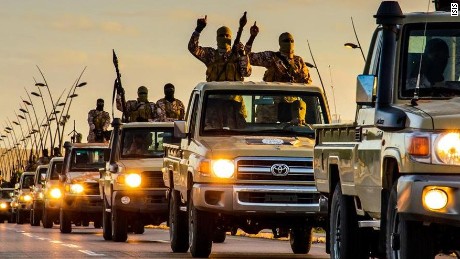
I would answer this with four points:
1. Its territorial scope is vast, but relatively useless, particularly on the Syrian side. Ar-Raqqah to Mosul - the traditional region of Al-Jazeera - is impressive on a map, but a region of little economic, historical or geopolitical weight. In fact, it's the desert heartland of the Khawarij historically and what agriculture potential was there has been decimated by drought and what large population communities were there have withered out to a large degree (eg. at least half a million people left Mosul).
Deir ez-Zor and Ar-Raqqah (despite being Harun ar-Rashid's capital for a few years), even before they were depopulated, are minor and insignificant cities that had the country's 7th and 8th largest populations respectively. Bilaad ash-Shaam's prestige, as relevant to Syria, is in the country's west; Syria's historical and economic centres are in the cities of Damascus, Aleppo, Homs, Hamah and Hawran.
Simple experiment: If you had a week in Syria, either as tourist or businessperson, what would your itinerary look like? Areas now held by ISIS would not come up because they don't register as significant. They are peripheral.
That tells you something about the lack of 'weight' of what they've taken as opposed to the other rebels (who have taken half of Aleppo city, Deraa up to rural Damascus, the Eastern Ghouta and some eastern suburbs of Damascus city, Quneitra on the Golan Heights, etc).
ISIS, not that impressive.
2. Mosul and Sunni Iraq, the undoubtedly impressive gain, was a low-hanging fruit. The Iraqi military's personnel packing up and running away in their underwear isn't a sign of exceptional military prowess on the part of ISIS - it's a sign of a corroding, corrupt and fundamentally inept Iraqi military that dissipates at first challenge, led by a corrupt political class that had completely disillusioned Sunni. The region was ripe for the taking and taking it isn't as epically impressive as it first appears.
Is that relevant? Of course it is, because it says more about the exceptionally dire condition of the Iraqi military than it says about ISIS capability - you're not as impressive as you think you are. You can force the rubbish Iraqi military to flee through your sheer presence, but how do you fare if Turkey takes a decision to invade your territory and take you out like it seemed poised to two months ago? How do you fare in the face of a professional, disciplined and emotionally-invested force? Kobane is giving the world a strong idea of ISIS' true capabilities and they're simply not as good as the reputation many would try to sell to you.
So if a few thousand Kurds with US air support (it's urban area, so air power is significant but not overwhelming factor) can stop ISIS in their tracks and swamp them in a bloody war of attrition, what about those states that stand in the way of ISIS and its fantasies? Turkey, Jordan, Saudi and Iran would each, if directly confronted, skin ISIS alive.
3. ISIS leaders and members are absolutely uncompetitive globally. I don't mean that as an insult, I mean that as a descriptor. Its principal constituent base is a loose coalition of angry 20 year olds [who need to be reached out to], pseudo-clerics with little credibility and deranged idiots. You'll get an exception here and there, but nothing to make a substantial difference to the quality and production capability of a 'state'.
They might have good multimedia people and acoustics engineers, but where are those who can help develop the hard-power capability to match those around them in a region armed to the teeth? There's only so much one can loot from Assad and the Iraqi military before they realise that while shooting down one jet is easy, bringing down an entire squadron or permanently neutralising an air threat that toys with you from the sky is impossible.
Bottom-line: How do you defend the 'sovereignty', dignity and airspace of your state? What, ISIS are going to take over the Middle East with their leaders and fighters holed up in urban areas every-time an American jet flies by? And there's no way that will change; these folks are incapable of producing anything sophisticated to seriously counter what they face, nor are they a magnet for the people that can.
4. ISIS economics doesn't work. It's impossible to survive, let alone flourish, as a state (i.e. Mosul and some minor cities) isolated from the world, unless North Korea is your model. If economic autarky is possible, ISIS are definitely not the ones to achieve it. They don't have the natural or human resources to sustain a quality of life over the long-term consistent with what the people expect or demand based on their past experience.
Modern trade requires mutual recognition between 'states' or some kind of international credibility. So, if ISIS need an MRI machine for a Mosul hospital or chemicals to treat the water, where does it get them from? Where do you get cancer drugs or the infrastructure for air transport in your 'state'? Those who produce these products cannot and will not sell them to you. Period - you're North Korea and a huge blow to the 'Islamic project' and its credibility.
Conclusion: ISIS, its prospects, its socio-economic architecture are not as impressive as presented by its supporters or propaganda machine. If anything, it is a fleeting, unsustainable and volatile reality.
What we provide!
Vote Content
Great answers start with great insights. Content becomes intriguing when it is voted up or down - ensuring the best answers are always at the top.
Multiple Perspectives
Questions are answered by people with a deep interest in the subject. People from around the world review questions, post answers and add comments.
An authoritative community
Be part of and influence the most important global discussion that is defining our generation and generations to come